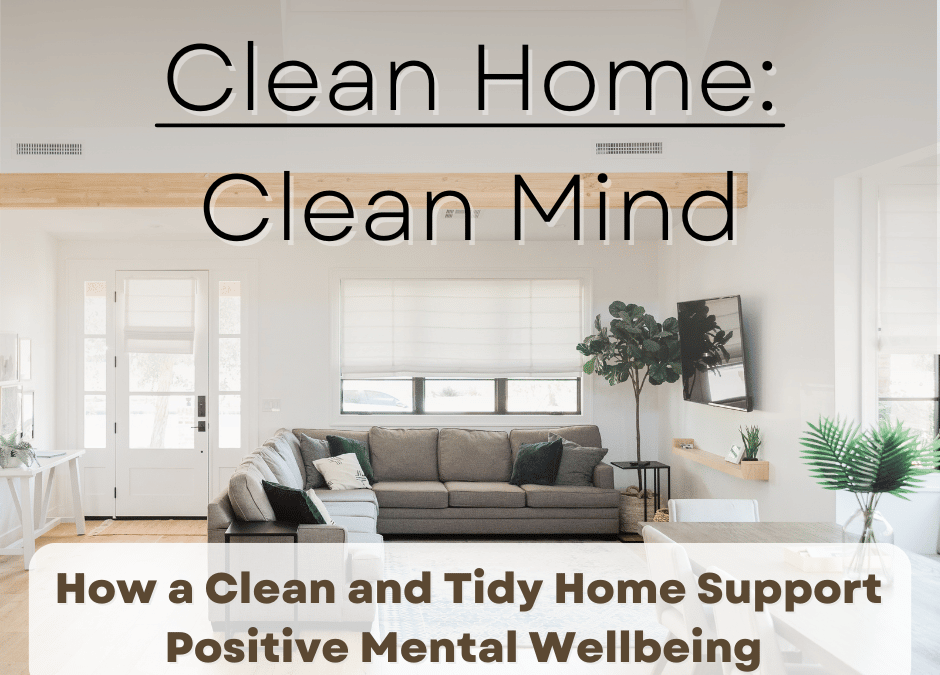Feeling low, down, depressed or hopeless can really interfere with energy levels. Low energy means no motivation to keep on top of the cleaning, laundry, and home chores. A messy and dirty home can also feed into negative thinking and feelings of being not good enough. It’s a vicious cycle. How can you get some balance on how your home affects your mental state. Creating a home where you feel can support positive mental wellbeing, so we’ll consider steps you can take to keep on top of cleaning without feeling like it’s a mountain you can’t climb.
Struggling with the Tasks of Daily Living & Struggling to Maintain Positive Mental Wellbeing
If you’ve visited a health professional to discus your mental health, they’ve probably asked you questions about your motivation and energy levels. Many of those questions are centered around daily living tasks. If you’re struggling with:
then it’s likely you would benefit from support for your mental health. The widely used assessment tool known as Patient Health Questionnaire or the “PHQ-9” asks 9-questions to help identify if a person is presenting with symptoms of depression. Some of the questions include to what extent someone:
The questionnaire also asks how difficult have these problems made it for you to:
A Clean Home = A Clean Mind
So, we know poor mental health can interfere with keeping on top of managing a home, and is one of the signs someone may be struggling. But, it’s also useful to look at the flip side. To what extent does taking care of things at home support mental health and well-being? The motto, “a clean house = a clean mind” has some ring of truth to it, and you may identify with the feeling that when your home feels clean and tidy, you experience a feeling of serenity and equilibrium.
Clutter Takes a Toll
can feel overwhelming, leading to feelings of not knowing where to start. Research has shown that homes can be described as “restorative” lead to reduced levels of the stress hormone, Cortisol, for the people who live there. Filthy floors, sky-high laundry piles, and stacks of dirty dishes are rarely the types of spaces we’d describe as restorative. People who described their homes as “cluttered” or full of “unfinished projects” were more likely to experience depression and fatigue.
A Clean Space Can Feel Like a Job Well Done
The act of tidying and cleaning can support a sense of self-efficacy – that lovely feeling we get when we know we have done a job well. Self-efficacy is a sense that we can trust ourselves and can enjoy the satisfaction that comes from the completion of a task. This explains why many homeowners feel “houseproud” and energized after a good old declutter and deep clean. And, if you are struggling with stress, cleaning can act as a helpful distraction to take your mind off the things that you may well be ruminating over.
A Clean Home is a Workout for Body and Mind
Recognizing the physical benefits of cleaning and tidying our home spaces is important. Running the hoover round, and scrubbing dirty surfaces is a workout of sorts, increasing our heart rate. We know that in various brain areas. Nicknamed “the happy hormone”, serotonin is a neurotransmitter that stabilizes and can improve mood and boost feelings of happiness and well-being.
Getting Things in Balance
Balance is important in the equation of mental well-being and clean homes. Some people with a diagnosis of OCD or health anxiety may experience a compulsive desire to clean and disinfect. Such compulsions can become overwhelming and steal any sense of balance or serenity. Equally, as we have seen, for someone in the grips of chronic depression, any type of cleaning can feel utterly impossible. You must seek help if you feel that you may be struggling with either of these extremes. We are looking to find a sense of balance, so that keeping on top of the housework and benefitting from a clean and relaxing space feels helpful rather than a burden. Think about what balance looks like for you, your family, and your home.
So, let’s take a look at 5 top tips that can support you to reap the positive mental health and well-being results from a tidy home.
Get everyone involved.
Sharing household tasks amongst family members allows everyone to benefit from a sense of shared ownership and reduces resentment. Even small toddlers can help with simple tasks such as placing dirty laundry in the basket.
Deal with dishes in the here-and-now.
Dirty dishes that are left can become an eye sore and a constant reminder of what still needs doing. Aim to deal with dishes after each meal so you get regular boosts of feel-good satisfaction from completing a job.
Benefit from baskets
Attractive allow you to hide clutter and create a more serene space.
Outsource as needed
If you are struggling in some way with physical or mental health, accept offers of support. Try to avoid getting to a place where you sense that things at home have gotten out of hand, as that is likely to exacerbate negative feelings. It’s okay to accept or seek outside help with housework and could be an important boost to Mental Wellness.
Don’t forget to sit back and enjoy your space
Build in times where you get to enjoy the serenity and equilibrium of your home space. Sit back, light a candle or put on some music. Remember to find ways to enjoy the safety, coziness, and restorative benefits of your home and space.
About the Writer: Jade Piper is a writer and mother based in Indianapolis. She is a keen environmentalist and in her spare time enjoys gardening, reading, and listening to music.
This content was originally published here.

